In the ancient heart of Hanoi, where mist rises from sacred waters, there grows a lotus unlike any other on earth. The Sen Bách Diệp—the Hundred-Petaled Lotus—blooms only in the mystical waters of West Lake, a flower so rare that for a thousand years, it has been sung in the folk songs of the capital:
Đấy vàng đây cũng đồng đen.
Đấy hoa thiên lý, đây Sen Tây Hồ.
Literal Translation: “There lies gold, here lies black bronze.
There blooms the celestial flower, here the lotus of West Lake.”
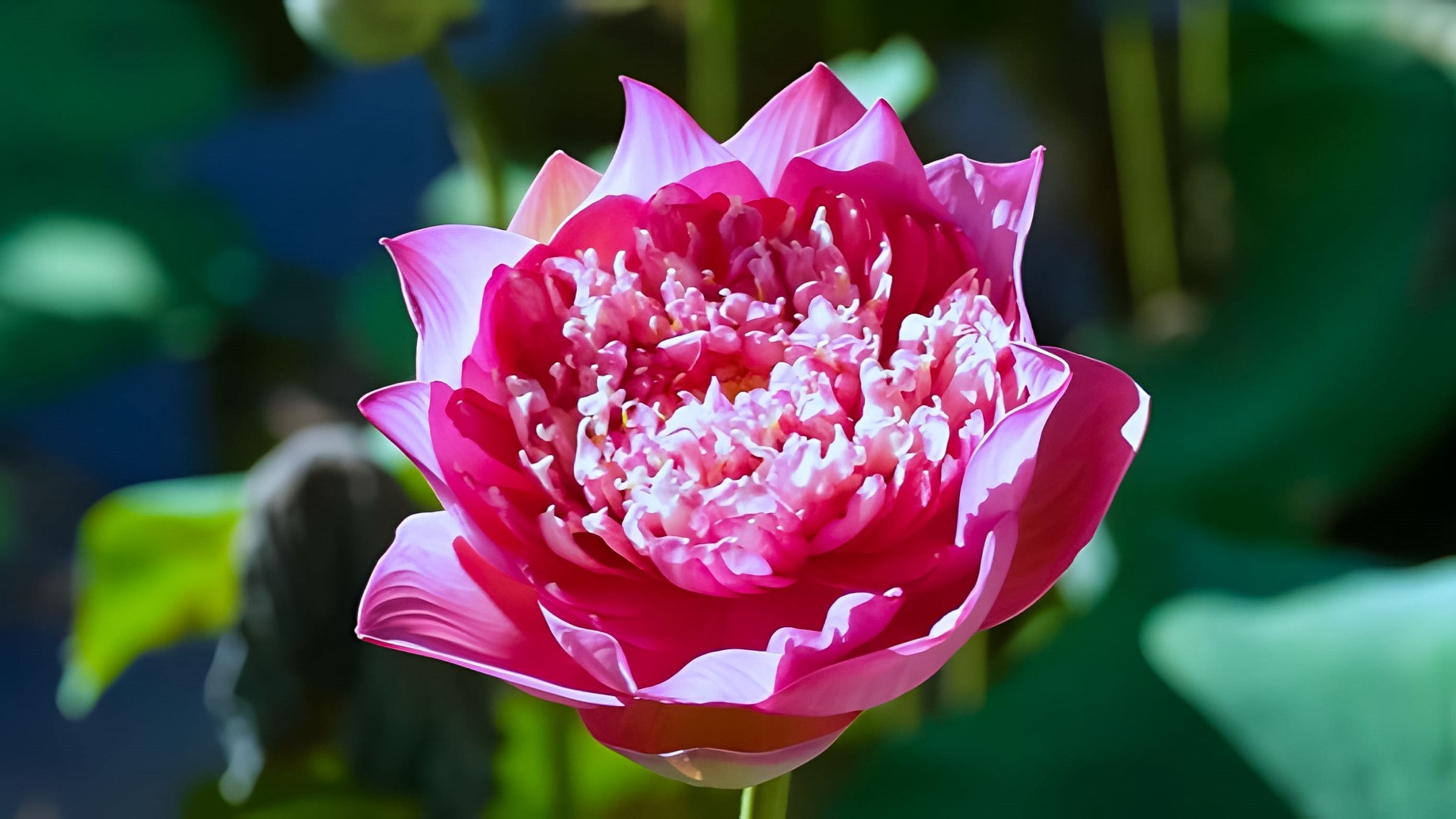
This is no ordinary lotus, and the tea born from its essence is no ordinary brew. Trà Sen Tây Hồ—West Lake Lotus Tea—stands alone in the world, its supremacy forged by an alchemy that cannot be replicated—the ancient soil, the sacred waters, and the millennia-old sediment that has transformed this corner of Vietnam into hallowed ground.
From the pearl-like lotus rice that capture the very breath of heaven and earth, the people of Hanoi have learned to marry the lotus with the finest tea leaves from the legendary tea-growing regions, such as Thai Nguyen and the mountainous Northwest. The result is more than a beverage; it is liquid poetry, a masterpiece of culinary art that embodies the refined soul of the ancient capital.
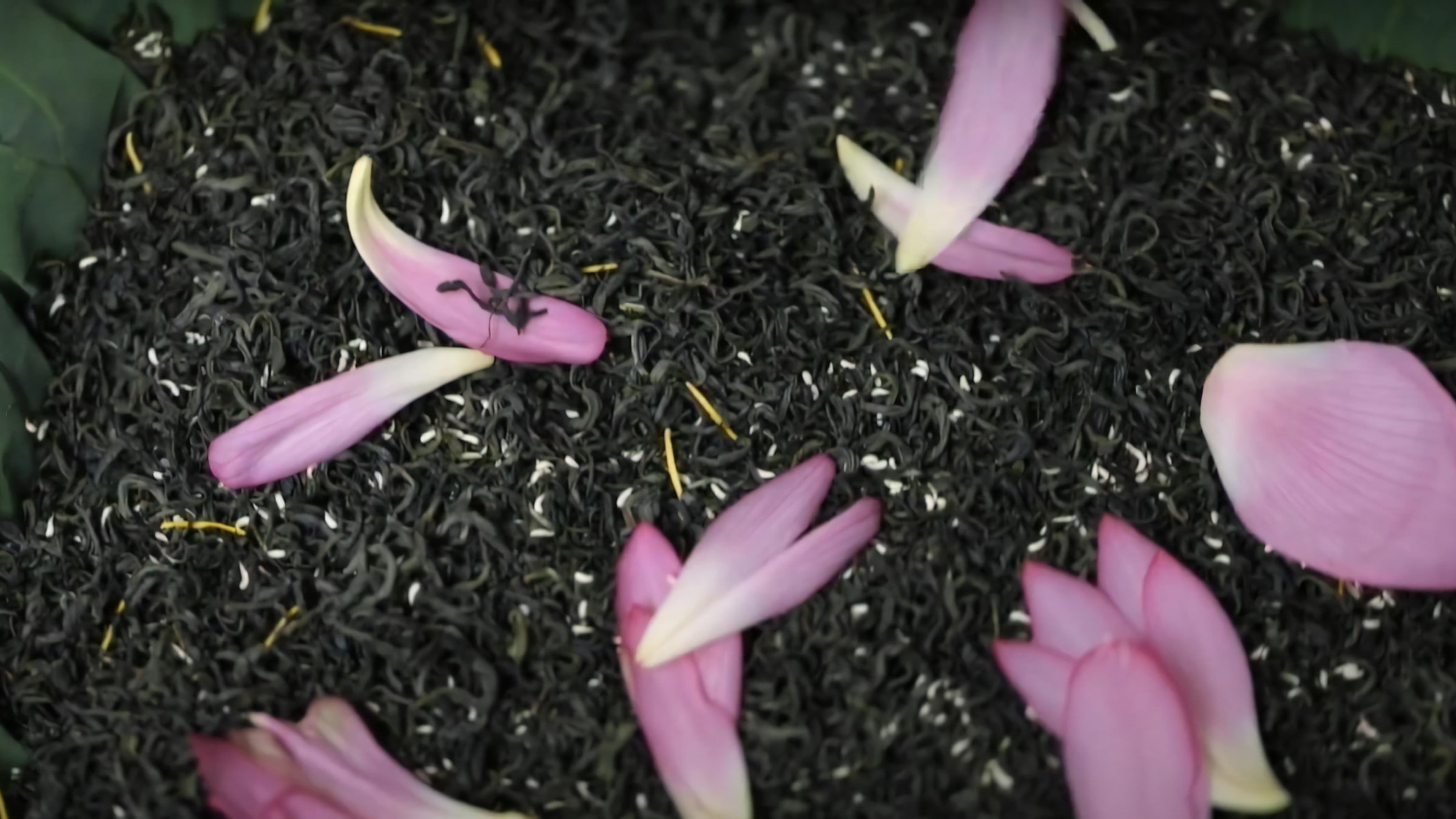
Today, authentic West Lake lotus tea is still crafted in limited seasonal batches by a small number of Quang An artisans. To craft lotus tea requires more than skill—it demands devotion. The work is arduous, the process sacred. Without a pure heart, the tea master will fail, for the lotus reveals its secrets only to those who approach with reverence.
Among all the drinks that grace this earthly realm, tea holds the highest place, and among all teas, the lotus tea of West Lake reigns supreme. While Vietnam boasts countless famous tea regions and celebrated varieties, none approaches the rarity and precious nature of this singular creation. In ancient times, West Lake Lotus Tea was reserved for emperors and nobles, earning its title as “The First Tea Under Heaven” (Thiên cổ đệ nhất trà)
The Sacred Land of Dragons and Waters
According to legend, in 1009, Emperor Lý Thái Tổ witnessed a dragon ascending skyward as he relocated the capital from Hoa Lư to Đại La. This celestial sighting inspired him to name the new capital Thăng Long, which means “Ascending Dragon”.
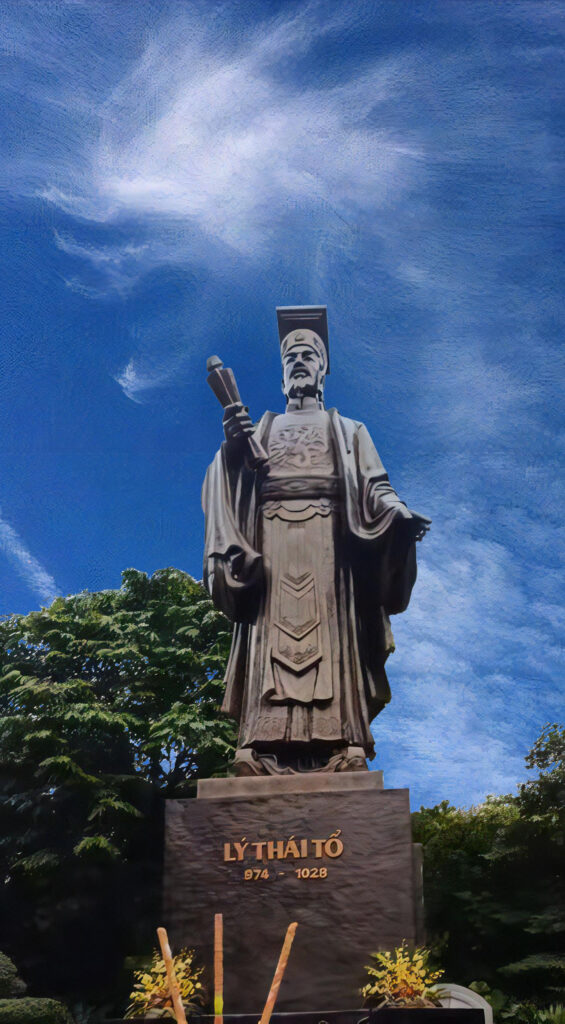
Thăng Long—the ancient name for Hanoi—rests upon sacred earth embraced by meandering rivers. Chief among these is the Red River, whose ancient currents carved the landscape and deposited the rich alluvium that would become the foundation of an empire.
In this low-lying realm, from the very beginning of time, nature carved ponds and marshes, creating a tapestry of waterways that would nurture extraordinary life. Archaeological traces reveal that an ancient branch of the Red River once flowed through this land, creating a vast natural lake beside the imperial city. Through the centuries, this body of water has worn many names, but Hồ Tây – West Lake has endured as its lasting identity.
The Quảng An peninsula (map) extends like an ancient finger into the West Lake’s heart, surrounded on three sides by water and dotted with many smaller ponds. This land has been inhabited since time immemorial, bearing witness to an unbroken chain of human settlement, each generation leaving its mark on the cultural and ecological tapestry.
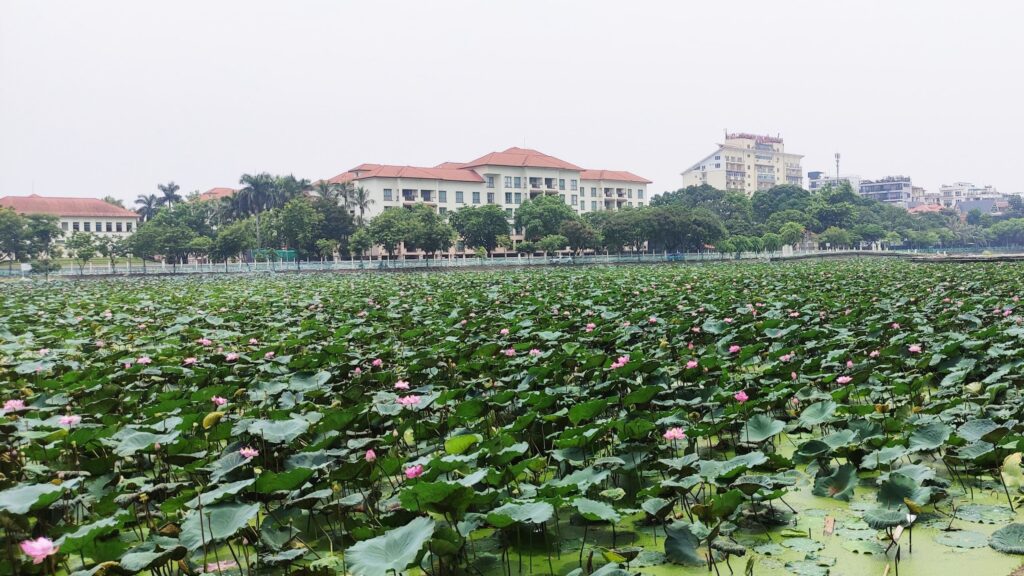
When the summer rains arrive, they bring torrents that fill the low-lying fields, creating a wetland ecosystem of stunning beauty. Here, migrating birds from the north—cranes, egrets, and wild ducks—find sanctuary in winter. The waters and the extraordinary soil, enriched by sediment accumulated over millennia to depths of three to four feet, have given birth to the legendary West Lake lotus: pink-petaled, double-flowered, and possessed of a fragrance that has no equal anywhere on earth.
The Hundred-Petaled Miracle
The West Lake lotus blooms with hundreds of petals, earning its name Bách Diệp. Its fragrance is beyond description, for West Lake is what the ancients called a “địa linh“—a place of spiritual power where the essential energies of heaven and earth converge.
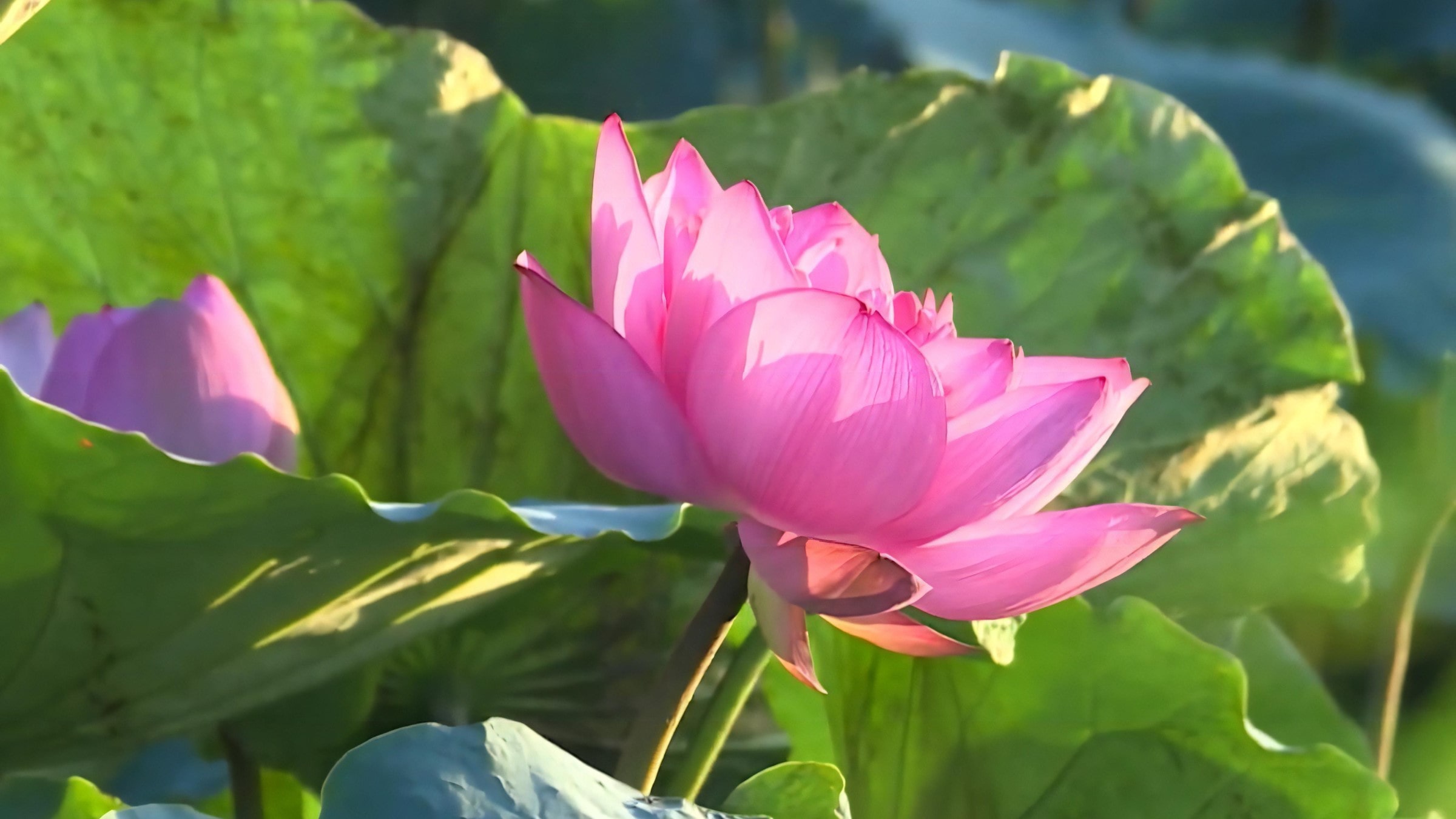
The ancient sages believed that in such sacred places, the very air pulsed with cosmic energy, and perhaps this is why the West Lake lotus, drawing its life from these mystical waters, carries a fragrance more sublime than any lotus elsewhere. Its scent so intoxicating, so mysteriously complex, that those who smell it speak of being transported. Unlike the simple sweetness of common lotus flowers, the West Lake bloom carries notes that seem to contain the very essence of the place: the morning mist rising from ancient water, the whisper of wind through temple eaves, the accumulated dreams of a city that has witnessed the rise and fall of dynasties.
The Hundred-Petaled Lotus is indigenous to West Lake alone—nowhere else in Vietnam, nowhere else on earth, does such a variety exist. It is West Lake’s own miracle, a gift from the marriage of sacred waters and blessed soil.
The Alchemy of Tea and Flower
From the earliest days, we Hanoians have recognized that we possessed something extraordinary. The lotus rice, gathered with reverence from these sacred flowers, found its way into the hands of tea masters who have the ability to see what nature has already perfected and help it find its highest expression.
These artisans began the delicate process of marriage. Lotus and tea, flower and leaf, fragrance and flavor, all woven together in a ritual that demands not just skill, but something the Vietnamese call tâm—heart, intention, the quality of soul that one brings to sacred work.
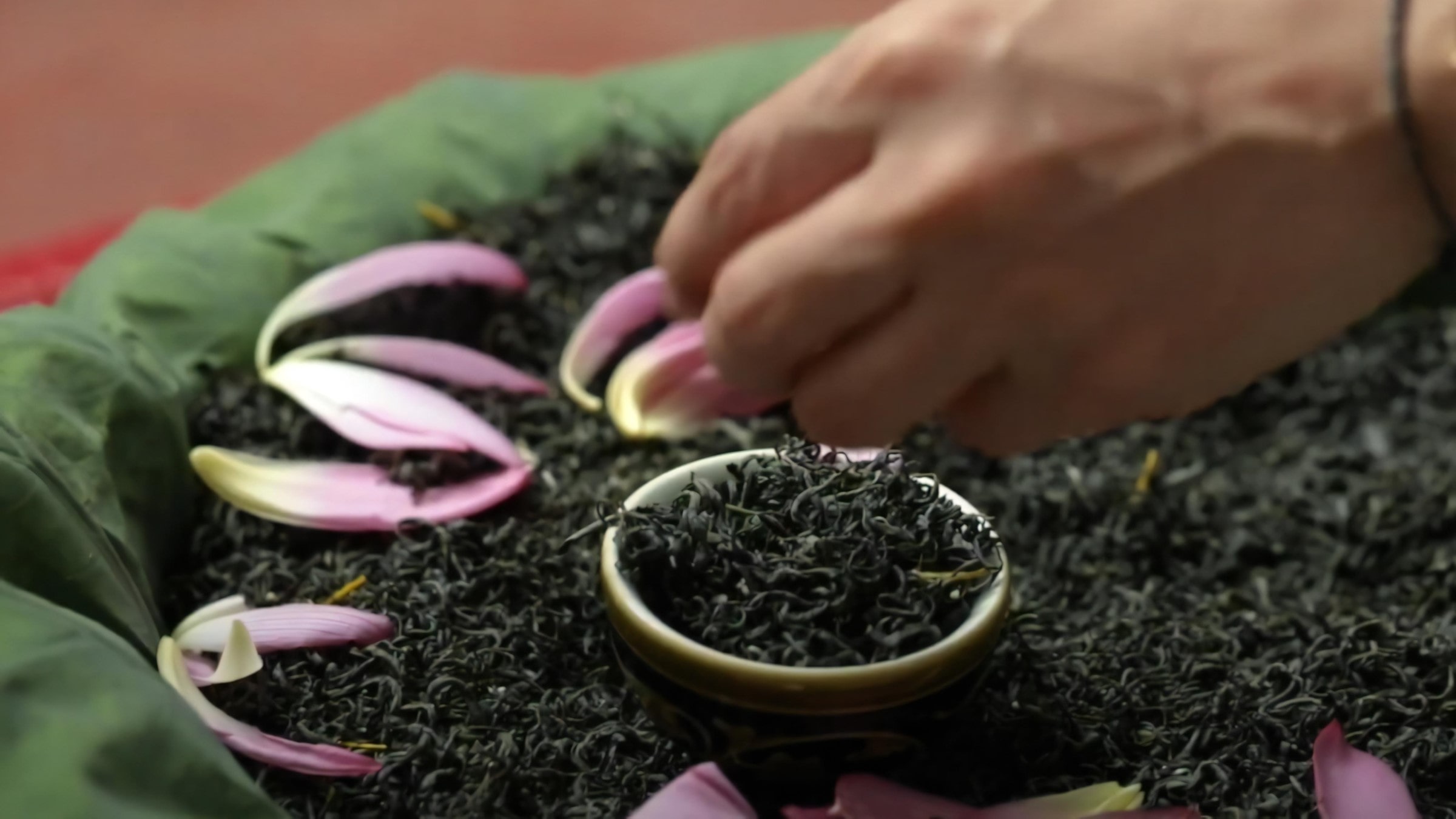
This is not work for the impatient. Creating lotus tea requires a devotion. Each lotus bloom must be gathered at precisely the right moment, each tea leaf selected with the discrimination of a poet choosing words. The process cannot be rushed, cannot be mechanized, cannot be reduced to mere commerce. Without tâm, without heart, the magic simply will not happen.
Voices from the Golden Age
Tracing the river of time backward, we find the earliest written records of West Lake lotus in the 11th century. The Đại Việt Sử Ký Toàn Thư—The Complete Annals of Đại Việt—tells us that during the Lý Dynasty, princes and princesses, nobles and court ministers built palaces and private retreats along the shores “beside the fragrant lotus beds of the villages around West Lake.”
The 18th-century scholar Phạm Đình Hổ, in his Vũ Trung Tùy Bút – Essays in the Rain, painted a vivid scene of Lord Trịnh Sâm‘s mid-autumn festival celebration in 1774:
“On that day, the Lord held court in his palace among the lotus beds, with lotus blooms below and lantern-draped trees above. Musicians played from the bell tower of Tran Quoc Pagoda or hidden beneath the shadows of ancient trees and stone embankments.”
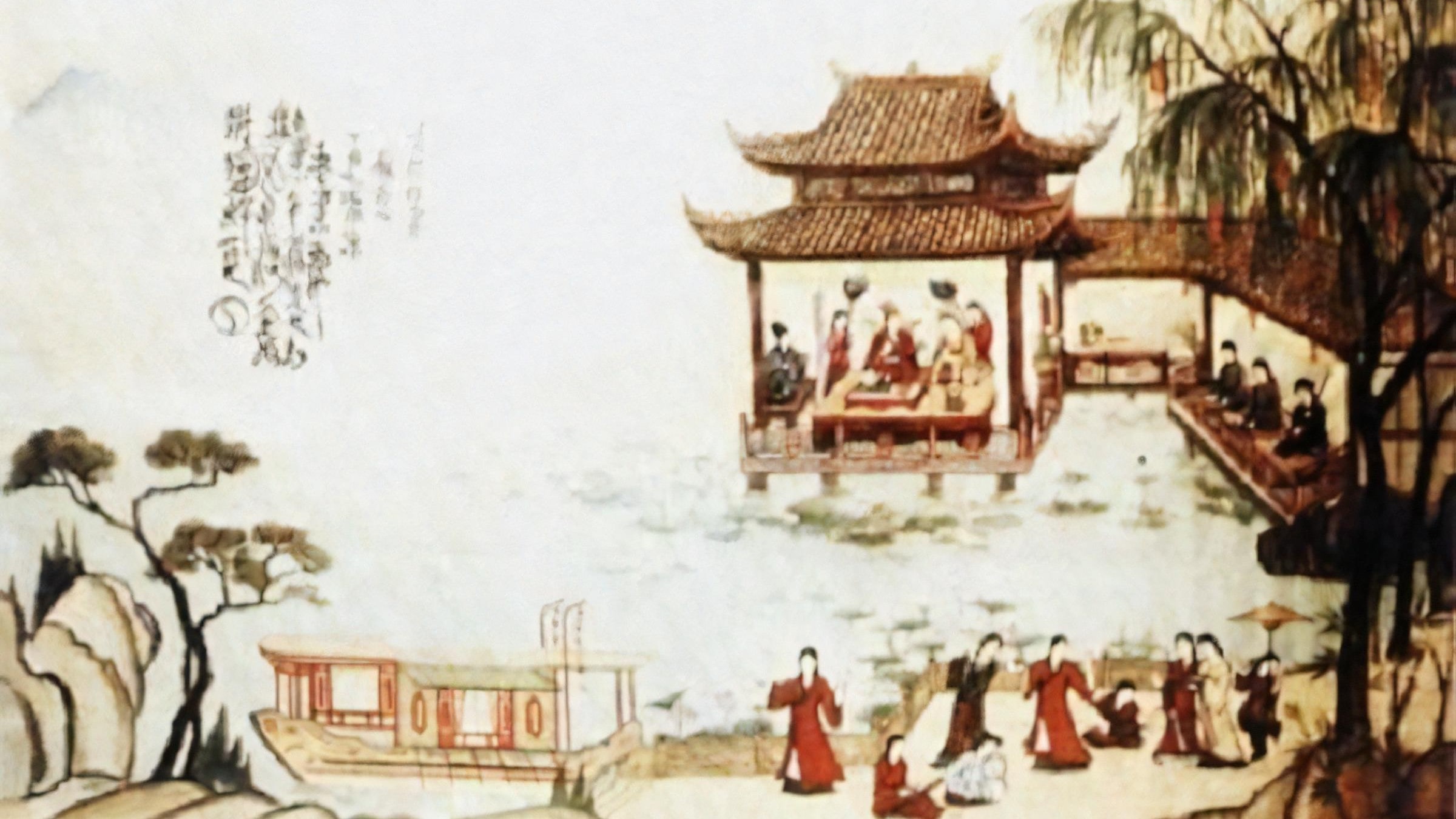
But it was Emperor Lê Thánh Tông, that great poet-emperor of the 15th century, who first captured the lotus in verse. In the royal literary salon, he composed poem after poem celebrating these flowers, establishing a tradition that would inspire generations of Vietnamese poets. Among them was Hồ Xuân Hương, the brilliant and rebellious poetess who lived near the lake and found in its lotuses a mirror for her own complex soul.
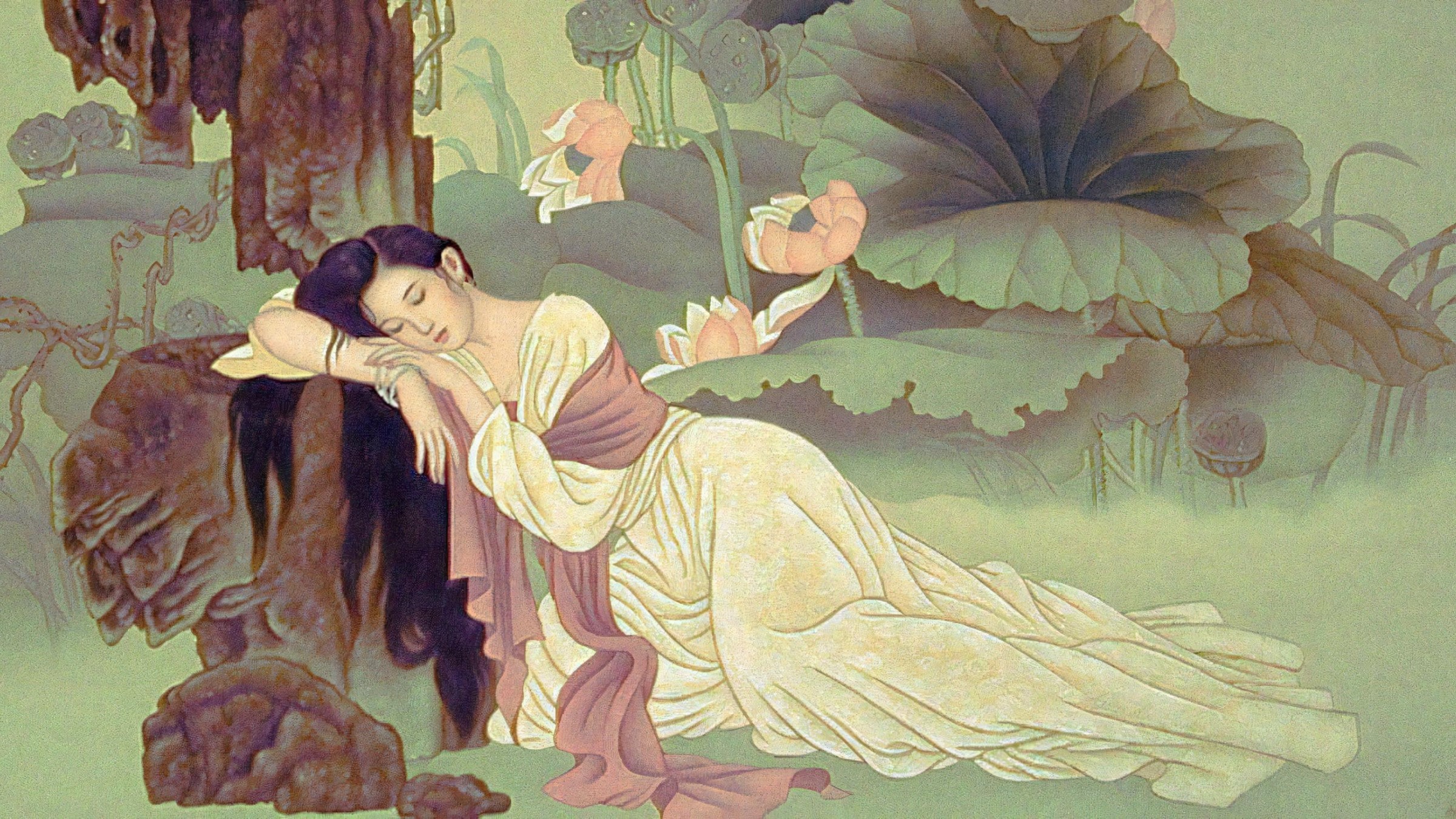
A Love Story Written in Lotus Petals
Nguyễn Du, courtesy name Tố Như—the man who would later give Vietnam its greatest literary masterpiece, The Tale of Kieu—was twenty-three when he came to live in a pavilion near West Lake. In one of literature’s most enchanting tales, West Lake lotus became the inspiration for Nguyễn Du. A poem by Tố Như titled Mộng Đắc Thái Liên – Dreaming of Picking Lotus became a beautiful and romantic literary legend. The poem captures the dreamlike scene of lotus gathering by West Lake’s shores:
Tây Hồ đi hái sen
Để lên thuyền hoa gương
Hoa tặng người ta kính
Gương tặng người ta thương
Sáng ngày đi hái sen
Hẹn cô hàng xóm bên
Chẳng biết tới không tới
Cánh hoa nói cười chen
Literal Translation: “Going to West Lake to pick lotus,
Flowers and mirror rest upon the boat,
The flowers I give to those I respect,
The mirror I give to those I love.
At dawn I go to pick lotus,
Meeting the girl from the neighboring house,
Not knowing if she’ll come or not,
The flower petals laugh and whisper together.“
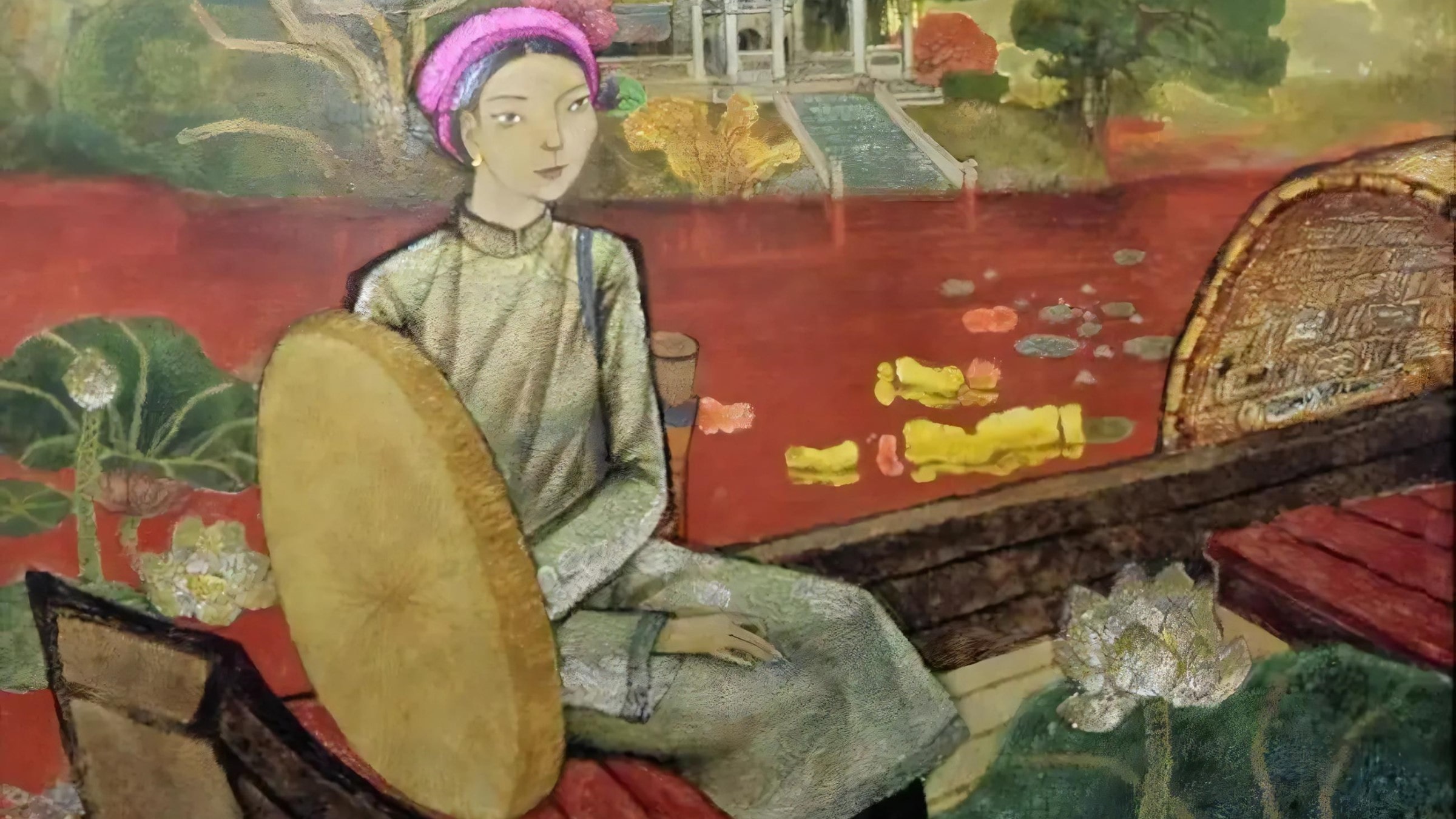
The scholar Hoàng Xuân Hãn, in his Thiên Tình Sử Hồ Xuân Hương – The Love Story of Hồ Xuân Hương, suggests that the “girl from the neighboring house” in Tố Như’s poem was none other than the poetess Hồ Xuân Hương herself. For three years, Nguyễn Du and Hồ Xuân Hương wove their love story beside West Lake.
Nguyễn Du was born into aristocracy but orphaned young—his father died when he was ten, his mother when he was thirteen. In 1790, at twenty-three, he lived in a lakeside pavilion belonging to his elder brother Nguyễn Khản, who served as Grand Chancellor.
Nearby, in Nghi Tàm village, lived a scholar named Diễn with his only daughter, Hồ Xuân Hương. She mastered classical Chinese and Vietnamese scripts with remarkable speed and possessed a gift for poetry and wordplay. Though many students admired her, none had captured her heart.
Hồ Xuân Hương met Nguyễn Du during a lotus-picking excursion by boat. He was twenty-three, thoughtful and melancholic; she was seventeen, radiant with life, brilliant and talented in poetry. The young pair became friends and quickly grew fond of each other. Though neither spoke of love, both felt a strange new emotion stirring within.
Their subsequent meetings at ancient temples around the lake, their conversations over tea discussing poetry and philosophy, wove a romance of extraordinary beauty. The West Lake lotus perhaps served as the poetic catalyst for the love between these two gifted souls, two of Vietnam’s greatest literary spirits.
The Treasure of a Thousand Generations
Through scientific research, historical evidence, and folk legends, we can affirm that West Lake lotus has existed for a thousand years. Though one might search the four corners of heaven or scour all of Vietnam, though one might encounter hundreds of lotus ponds large and small, nowhere will you find a hundred-petaled lotus as fragrant as those in West Lake’s sacred waters. The Hundred-Petaled Lotus is Hanoi’s own natural treasure.
Imagine standing at dawn in the middle of the fragrant lotus pond, when a cultured soul suddenly conceived the idea of marrying the lotus fragrance with tea. The harmonious blending of fragrance and flavor from these two special products created a drink containing the most exquisite artistry and perfect elegance that generations of Hanoi people have always treasured.
According to elders from the Quảng An region, from the early 20th century, when lotus season arrived, people would buy lotus flowers from vendors who carried them to Đồng Xuân Market and the Old Quarter streets, selling them to families in the city for tea scenting.
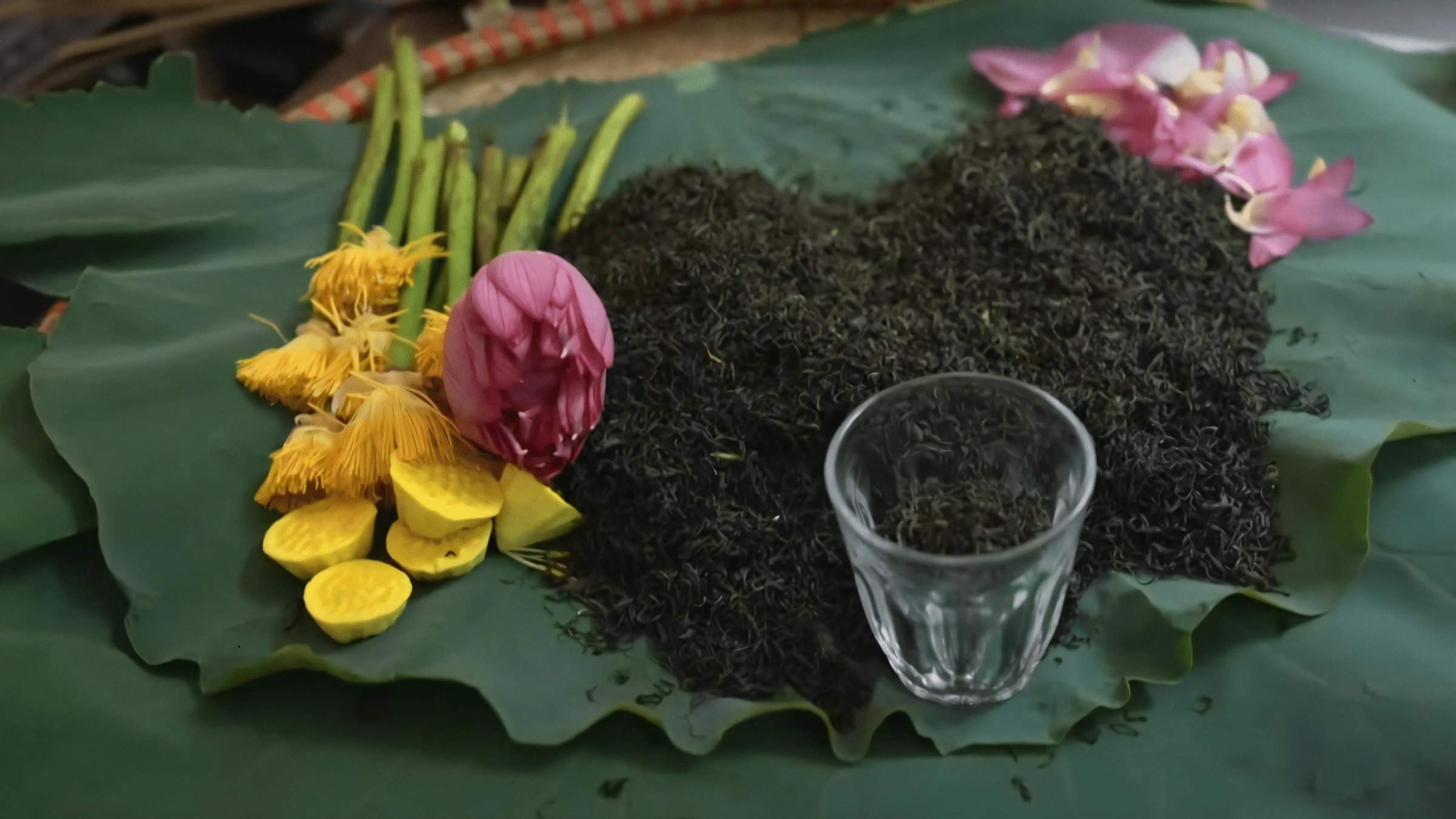
Master tea artisan Hoàng Anh Sướng, who has served West Lake lotus tea to prominent figures including Emperor Akihito of Japan, Chinese President Xi Jinping, and billionaire Bill Gates, recalls: “I was born into a family with a tradition of tea-making, especially lotus tea scenting, so my childhood was filled with lotus flower imagery. I still remember following my parents to West Lake to pick lotus as a child. The lotus flowers didn’t just return to our home—they filled every alley and street of Hanoi. Hanoi people deeply love lotus flowers. During summer, each day, my father Trường Xuân would bring home thousands of lotus blooms, and our entire house would overflow with lotus flowers, saturated with their fragrance, and our small street would be perfumed with lotus essence. This remains one of my life’s most beautiful memories.“
The Soul of Vietnamese Tea Culture
If northern Vietnam is one of the cradles of tea cultivation, then the lotus tea of West Lake represents indigenous culture—a purely Vietnamese creation.
The early appearance of tea plants on Vietnamese soil placed Vietnam among the world’s earliest tea-drinking civilizations. Vietnamese tea culture is remarkably rich, spanning from the elaborate ancient drinking customs of emperors and nobles to the simple folk traditions and modern practices of today.
According to researcher Trịnh Quang Dũng, author of Văn Minh Trà Việt – Vietnamese Tea Civilization, who first mapped the cultural history of Vietnamese tea, the origins trace back 5,000 years to the divine ancestor Shennong, then spread throughout the Vietnamese community. Initially, Vietnamese ancestors used tea medicinally, calling it “medicine tea,” then gradually it became a refreshing drink during the hunter-gatherer period—this formed the foundation of Vietnamese folk tea culture.
Throughout history, many Vietnamese feudal rulers emerged from farming backgrounds and lower social classes. They refined and elevated folk tea culture into imperial tea culture. This evolutionary process, unfolding over thousands of years, created a uniquely rich Vietnamese tea cultural history unmatched anywhere in the world.
From the nation’s thousand-year tea-drinking experience, Vietnam’s most celebrated teas were selected to combine with West Lake lotus, giving birth to this most refined and distinctive drink of Thăng Long Hanoi—a beverage that carries within it the distilled wisdom of centuries, the breath of dragons, and the eternal fragrance of the hundred-petaled lotus that blooms only in sacred waters.
Here we have only traveled one-third of the journey to understand West Lake Lotus Tea—to truly understand this celestial brew, we must witness the artistry behind its creation. [Continue reading Part II: The Art of Handcrafted Lotus Scenting] to discover the dawn pilgrimages, ancient techniques, and devoted hands that transform humble lotus blooms into liquid poetry.
